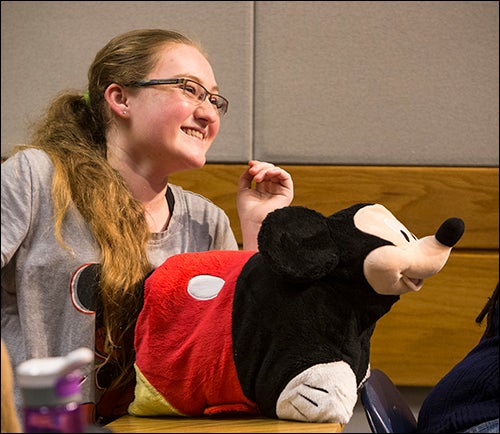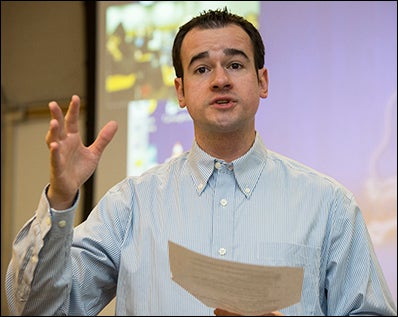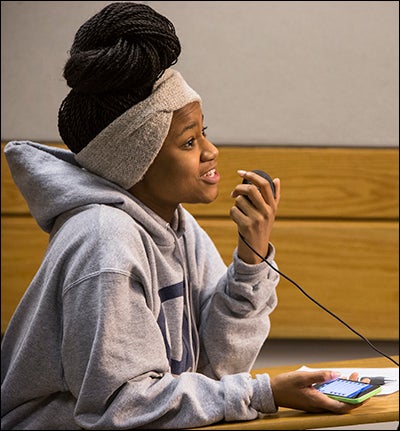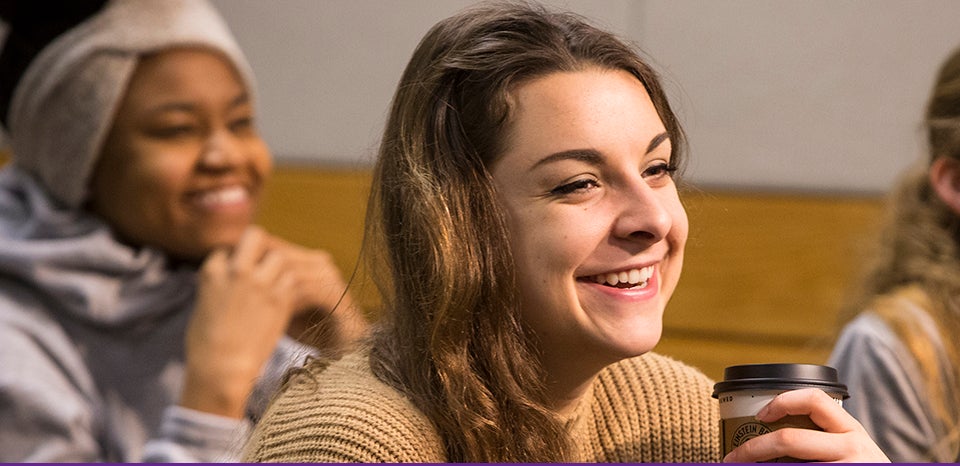SHATTERING STEREOTYPES
Global Understanding course links students across continents
Freshman Payton Miller said she’s often dreamed of traveling overseas and studying abroad but she never really believed that was an attainable goal. Until now.
“After just a few weeks in this class seeing and talking with college students in Algeria, the whole idea of going to a foreign country isn’t scary to me like it once was,” Miller said. “I’ve learned that they dress differently than we do and they have different customs but there are more ways we’re alike than there are ways we’re different.”
Miller, who is from Wilkesboro, is a student in one of 20 class sections of a global understanding course offered this semester. Linked by live video conferencing, Internet chat software and social media, the classes connect ECU students with their counterparts in different countries. Several academic departments, including English, sociology and foreign languages, offer the course.

ECU student Kaitlyn Burley shares an icon of American culture with fellow students in Algeria.
Ten years after it launched, the program is broadening the horizons of a growing number of ECU students like Miller and attracting international attention. The program recently was recognized for its innovative approach to helping students learn more about cultures around the world.
It captured third place in the “Presence Learning” category at the 2014 Wharton-QS Stars Awards: Reimagine Education conference. The event was held Dec. 8-10 at the Wharton School at the University of Pennsylvania in Philadelphia. ECU was one of 21 award recipients chosen from initiatives at 427 universities and enterprises in 43 countries.
ECU offers its global understanding course in partnership with 58 institutions in 30 countries on five continents, said program director Jami Leibowitz. She said language is not a barrier because most of the foreign students speak English.
The more than 300 ECU students who are enrolled in the global understanding course this semester are focusing on four topics—college life, family and cultural traditions, religion and the meaning of life, and stereotypes, said Jennifer Sisk, a teaching instructor in the English department who leads the English 1000 Global Understanding class.

ECU anthropology professor Dr. Blakely Brooks leads an ECU Global Understanding class.
On one recent morning, Miller and her classmates in Anthropology 1050 Global Understanding are acquainting the Algerian students with everyday aspects of American culture. One has brought a model car and tells the Algerian students how Americans love and rely on automobiles. Another holds up a clock to demonstrate Americans’ obsession with working long hours. A third brings an athletic shoe and talks about how Americans love sports.
Watching intently is a class of male and female students at the University of Abou Bekr Belkaïd in Tiemcen, Algeria.
Then it’s their turn for show and tell.
One student stands and points to a traditional Algerian hat he is wearing. He explains to the ECU students that it helps keep him warm in the winter and cool in the summer. Then he demonstrates that the hat really is a scarf wrapped carefully around his head.
The ECU students seem impressed by the scarf-that-becomes-a-hat. Some who have scarves around their necks on this chilly morning begin winding them around their heads, which the Algerian students applaud.
Teaching Assistant Professor Blakely Brooks, who is leading the class, chuckles. “The stereotypes our students have, they find out they just aren’t correct. And the foreign students find out their ideas of Americans often aren’t correct.”

ECU student Seanta Baker interacts with students in Algeria in ECU’s Global Classroom.
“Students love this class,” said Sisk. “And it’s benefitted me, too. I used to consider myself a worldly person but now I have learned so much more.”
Miller said the Algerian students seem genuinely interested in the everyday lives of American college students. “They ask about college life here – how we live, what we do, what campus is like.”
She said she’s learned that many notions she had about foreign students were wrong. “Most of the kids we talk to are in engineering-related fields and it seems sometimes they are more educated than we are.”
The lasting benefit of the course is that ECU students learn “to develop essential skills necessary to succeed in a global, multicultural society,” Leibowitz said.
Leibowitz said she believes the global understanding course is valuable because most ECU students cannot afford to travel overseas or study abroad. “Our goal,” she said, “is to give everyone the opportunity to have some sort of real-time international experience.”
More details about the global understanding course is available at http://www.ecu.edu/cs-acad/globalinitiatives/course.cfm.

Pictured below, a screen at the ECU Global Classroom shows the students from Algeria, with the ECU class shown in the upper left.
